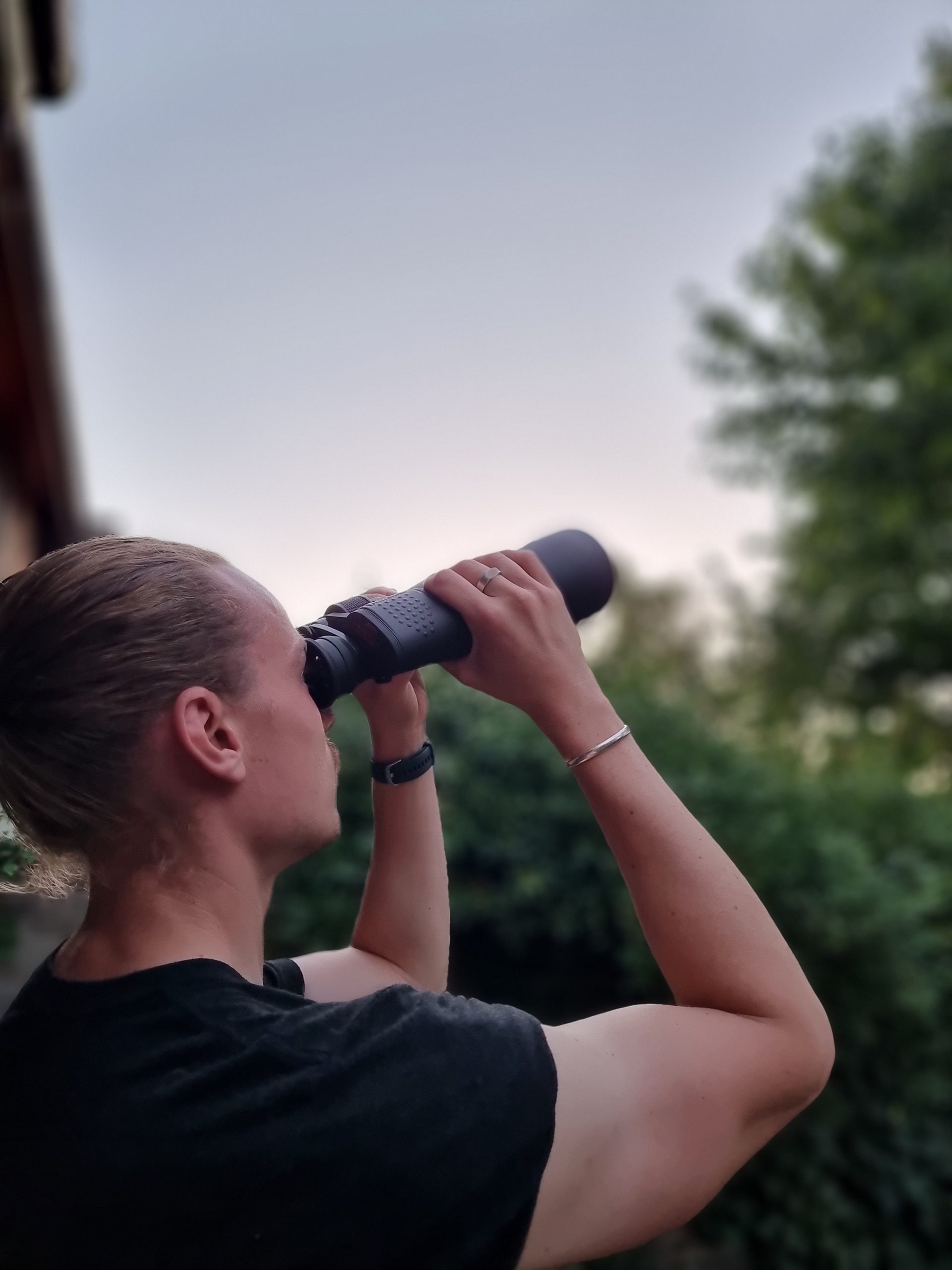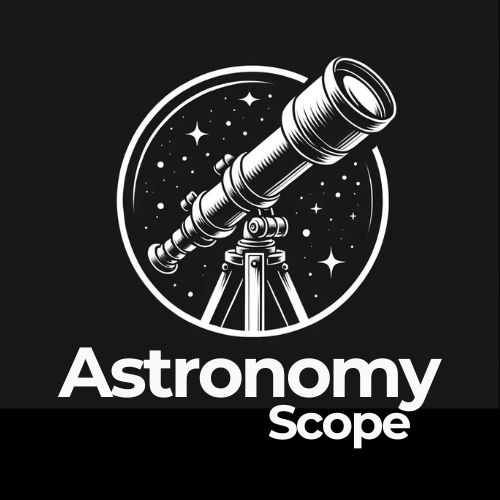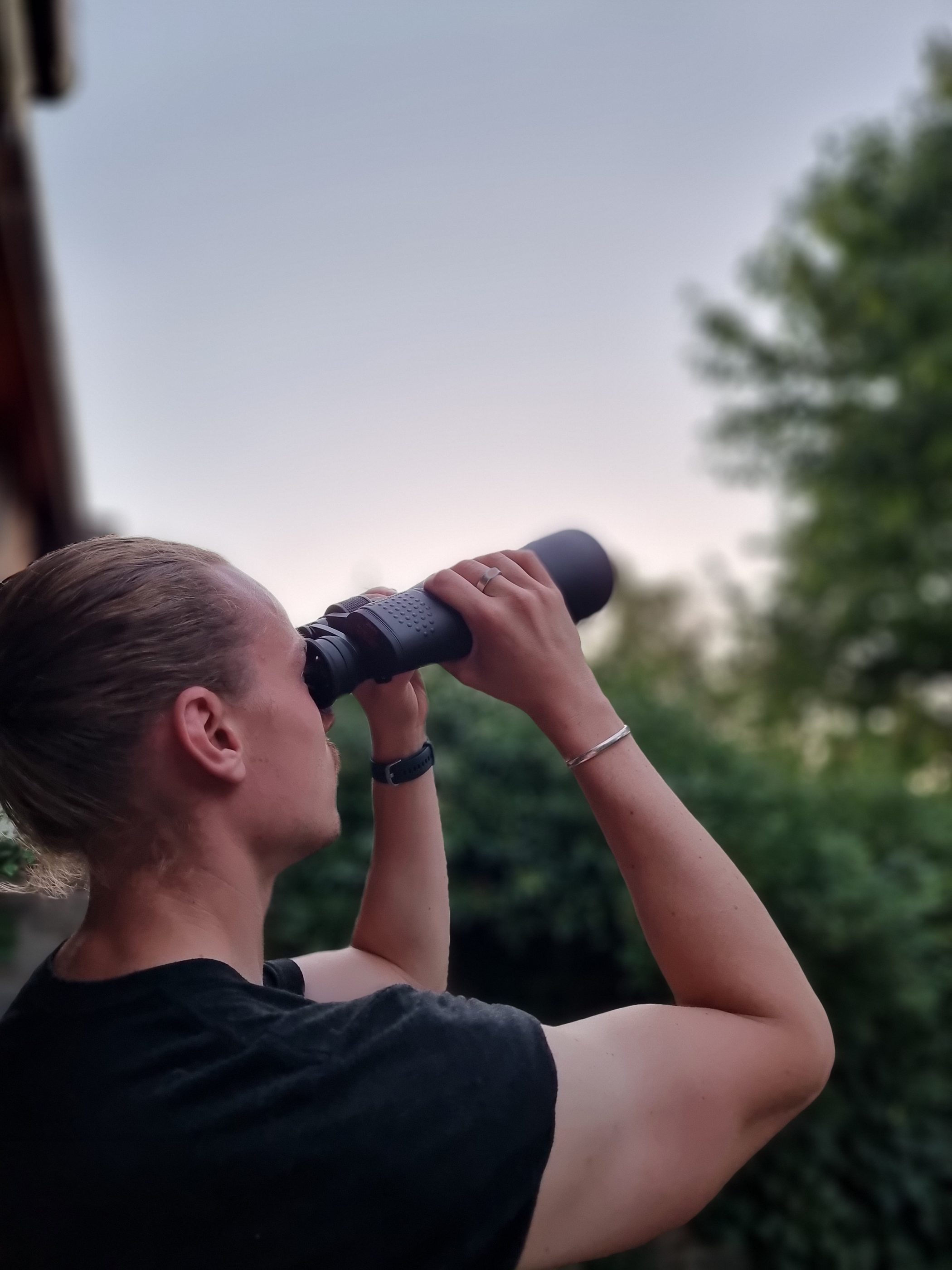You want to observe the night sky with binoculars but you wear glasses. I get it.
As a fellow glasses wearer, I know the challenges we face when it comes to getting equipment.
And unfortunately, not all binoculars are suitable. Some we could use, but will not be able to benefit from their full power.
But this does not have to be the case. So long as we get the right binoculars, to begin with.
So, I’ve decided to pull together a list of the best binocular options for us astronomers who wear glasses.
Best Astronomy Binoculars For Glasses Wearers








Astronomy Binocular Details
Celestron SkyMaster 15 x 70 Binoculars
- POWERFUL 15X MAGNIFICATION: With these giant astronomy binoculars, you get massive 70mm objective lenses and powerful 15x magnification. It's the most popular combination for viewing objects in the night sky and distant land-based targets.
- INCLUDES TRIPOD ADAPTER: Stabilize your binocular for added comfort and shake-free views. Mount your 70mm SkyMaster binoculars on any traditional photographic tripod with the built-in tripod adapter.
- BRIGHT, SHARP VIEWS WITH BaK-4 PRISMS: The SkyMaster is a favorite among those who view in dim conditions near dawn and dusk or at night for astronomy. BaK-4 prisms maximize light throughput to your eye so you see brighter, more detailed images.
- DURABLE AND WATER-RESISTANT: A rubber-armored housing protects your binoculars from damage and provides a secure gripping surface. The water-resistant exterior stands up to tough conditions and unexpected rainy weather.
- UNBEATABLE WARRANTY & CUSTOMER SUPPORT: Buy with confidence from Celestron, a leading optics brand in California since 1960. Your purchase includes a Celestron Limited Lifetime US Warranty & US-based expert tech support.
Orion Giant View 15×70 Astronomy Binoculars
- Portable yet powerful, these binoculars feature 70mm objective lenses and 15x power magnification
- BAK-4 prisms and fully multi-coated optics ensure great light transmission and contrast
- Individual binocular eyepiece focusing for enhanced accuracy
- We recommend using a tripod for extended viewing, attachment to tripod requires L-adapter and field tripod or binocular mount (all sold separately)
- Includes heavy-duty aluminum case, dust caps, and more
Orion 20×80 Astronomy Binoculars
- Big 20-power astronomy binoculars with huge 80mm aperture objective lenses provides bright, high-contrast views of the night sky with sharp resolution
- Giant 80mm lenses gobble up light for spectacular views of the Moon, planets, star clusters, and more!
- Fully multi-coated optics and BAK 4 porro prisms ensure maximum light throughput for bright, clear views
- Long 17mm eye relief for comfortable views - even while wearing eyeglasses!
- Includes built-in tripod adapter, soft carry case, and dust caps. Tripod use recommended
Zhumell 12×70 Astronomy Binoculars
- Large 70 mm objective Lens offers maximum image brightness in Low-light conditions
- 12x magnification is great for both Astronomical and terrestrial viewing
- Can be mounted on a tripod for steady, hands-free viewing
Can I Use Binoculars If I Wear Glasses?
Whether or not you can use binoculars if you wear glasses, will primarily depend on the design of the binoculars. Thankfully, there are binoculars that have been designed for eyeglass wearers in mind.
The particular feature to look out for here is ‘Eye Relief’.
Eye relief is the distance that your eye can be from the eyepiece while still obtaining the full viewing angle.
It is generally recommended that you need to have at least 18mm of eye relief to be able to observe through the binoculars while wearing your glasses.
Anything less, so for instance, binoculars with a 12mm eye relief is simply insufficient.
12mm is quite simply insufficient eye relief to use with glasses.
Sure you could try, but you can expect your glasses to get in the way, you will have reduced clarity and your eyes will fatigue much faster as your eyes have to work harder!
All not what you want when observing.
What Are The Best Binoculars To Use For Astronomy You Wear Glasses?
The best glasses to use while wearing glasses will provide sufficient eye relief first and foremost.
From there, other qualities will help you to observe the night sky and the celestial objects you want to observe.
These are:
Magnification Power
This is the number that comes first on a set of binoculars. Thus, if we take the 15×70 Skymasters, the ’15’ represents the magnification power.
Now, the larger the number, the more magnification the binoculars will provide you.
And more magnification means objects observed will appear closer under view than with a pair of binoculars with a lower magnification.
Magnification power is important for higher resolution and clear images; so long as it is supported by a sufficiently sized objective lens (which we will discuss below)
Objective Lens Aperture
The objective lens size is the second number on a pair of binoculars. So continuing with our example, for the Skymaster 15×70, the objective lens on this pair of binoculars is 70mm.
The larger the size of the lens, the larger the aperture.
And aperture is what allows you to collect more light.
And more light means you can see more distant or fainter objects.
It also means you will be able to see objects with more clarity, especially in poor viewing conditions.
Optics Coating
The coating of the optics is essential. It helps to minimize light reflections and helps provide you with better images.
The cheap brands of binoculars tend to forgo coating altogether, whereas the reputable brands will multi-coat their lenses.
Multicoated lenses are some of the best to get; they help to reflect any light and ensure you observe with utmost clarity.
Field of View
Essentially refers to how much you can see at any one time. For astronomy, the larger the field of view, the more of the night sky you will see at once.
The field of view of a pair of binoculars if often described in two different ways:
- By feet/metres over a distance,
- By angle,
Either way, more field of view is better for observing fast-moving objects. Yet, less field of view enables you to focus more on a particular part of the sky.
It comes down to preference and what you want to observe.
Weight
Weight is essential and can have a big impact on how, or how long you can use your binoculars without tiring. Of course, this will depend on person to person.
Although, the heavier the binoculars the more cumbersome they will be to carry, use and work with on the go.
For heavier binoculars, you will likely require a tripod. This will allow you to set your binoculars up and take the weight away. But, it is an additional cost to consider.
Water Resistance
It’s also imperative to purchase a pair of binoculars that have some form of water resistance. This will protect the lenses and the prisms from any water or moisture that is able to penetrate through.
This will not only help protect them and keep them working optimally, but it will also help to reduce any fogging that can happen in inferior or binoculars without water resistance.
Finally
Wearing glasses is never easy. It certainly comes with its joys and inconveniences.
If you want to partake in astronomy, unfortunately, you cannot just pick up or select any binocular.
Thankfully, there are brands that had eyeglass wearers in mind.
They have made a number of options that make binocular use far more effective, comfortable and practical.
Any binocular cited here in this buyer’s guide will do you well. Besides, there were specific criteria they had to meet to make the cut!
The Celestron Skymaster 15x70s is the editor’s choice; being lighter, more portable, and practical.
That being said if you were looking for a little more power, you will not go wrong with the 20×80 Orions. although you may need to consider a tripod.

Hey, my name is Jeremy. I’m a passionate and seasoned astronomer who loves nothing more than observing the night sky. I also love researching, learning, and writing all things Space and the Universe. I created Astronomy Scope to share my knowledge, experience, suggestions, and recommendations of what I have learned along the way while helping anyone to get into and maximize their enjoyment of the hobby.

